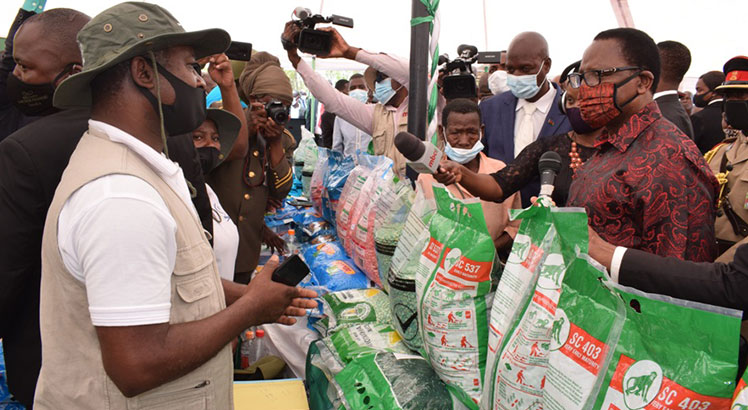13 suppliers Boycott AIP
This year’s Affordable Inputs Programme (AIP) has suffered a fresh setback as 13 companies, including major agro-dealerships, have shunned the exercise despite being issued contracts.
The suppliers are Chipiku, Rab Processors, Kulima Gold, ETG, GYP Imports & Exports, Kelvam Enterprise, Tiwale Investments, Bakwena Investments, Milazi Holdings, Worldwide Wholesalers, Midima Holdings, Ellite Engineering Supplies Limited and Nellie Investment.
The move could leave a shortfall of 800 000 bags of fertiliser as the 13 collectively were expected to supply 40 000 metric tons (MT) to cover 400 000 beneficiary smallholder farming households. The programme has 3.7 million beneficiaries.
In an interview yesterday, Ministry of Agriculture spokesperson Gracian Lungu confirmed that some companies have not signed AIP contracts, but downplayed the potential impact.

year’s AIP in mid October in Chiradzulu
He said the ministry will cover the gap left by the 13 suppliers and has started the process of procuring 150 000 MT of fertiliser expected in the country in a month.
Lungu said: “We are already working on procurement of a buffer stock which is around 150 000 metric tons and we are sure that in a month or some weeks, suppliers who are to be contracted to supply this buffer stock will start bringing these inputs.
“We will use Admarc and SFFRFM [Smallholder Farmers Fertiliser Fund of Malawi] to continue operating in their depots to enable the farmers to access these inputs in good time and close to where they are.”
But he fell short of providing reasons the suppliers cited for turning down the contract offers, saying they were best placed to explain.
Sources said some of the companies collected the contracts, but did not sign them while others did not collect at all.
Fertiliser Association of Malawi executive administration officer Mbawaka Phiri, who is on record as having cautioned government against pegging the price of fertiliser at K27 000 per bag, said the suppliers might have boycotted the contracts due to low price.
She said government needed to engage the suppliers on the price because it was not only members of her association that are not comfortable with the price offered.
“Even SMEs who are not members of the association are finding it difficult to supply at that amount. There is need to engage suppliers on the matter. The same thing happened last year,” said Phiri.
She said the association is ready to work with government on the matter.
In a separate interview yesterday, agriculture policy expert Tamani Nkhono Mvula said he was not surprised that some traders have rejected the contracts as the K27 000 price was not practical for business.
He said: “People supplying fertiliser would want to make business. It is unfair for government to dictate the prices. The landing cost of fertiliser is high. Selling the fertiliser at the price that government is demanding would mean suppliers subsidising, which is not practical.”
Mvula also wondered if the fertiliser government is procuring will get to farmers on time as the rains have started in some parts.
He advised government to engage suppliers on the prices and ensure that farmers have inputs.
Spot checks this week showed that beneficiaries are struggling to access the subsidised inputs due to several factors, including unavailability of fertiliser and hybrid seeds as well as network glitches. In some cases, beneficiaries have ended up spending nights at agro-dealer depots while others had their names missing from the list.
Initially, government engaged 164 suppliers, including small and medium enterprises (SMEs) to manage the programme.
However, in its October 30 2021 edition, our sister newspaper Weekend Nation reported that there were fresh bottlenecks in the programme, especially involving SMEs who were failing to access financing from commercial banks.





